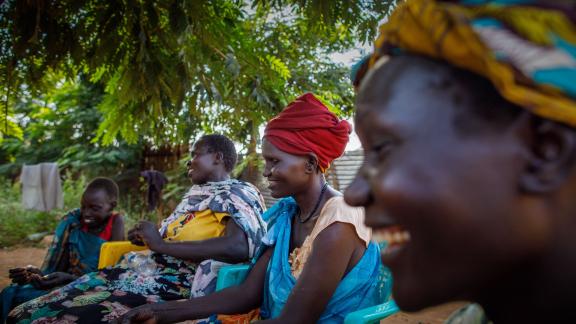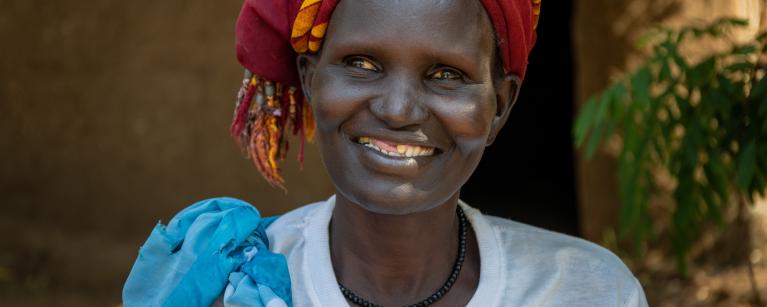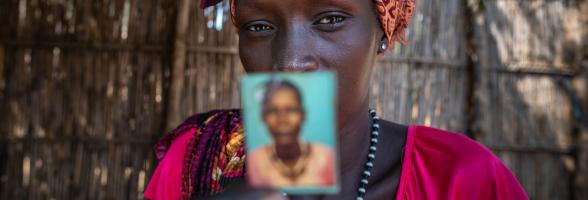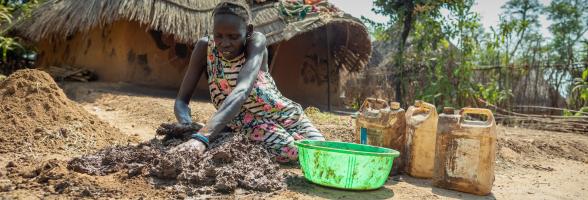In the heart of Tierkidi, a refugee camp nestled in Gambella in Western Ethiopia, a group of men gather next to a grass-thatched hut called “tukuls” in South Sudan. They are in a deep discussion about the election of new camp representatives and other issues that affect the community.
Among the men talking loudly, stands one solitary women - 42-year-old- Nyawouw, a refugee from South Sudan whose role is to–represent the women's voices at the meeting.
Nyawouw says that it is not always easy for women to be in these spaces where camp decisions are made. “In these gatherings, it is my job to make sure women's voices are well represented,” she says, determined to defend the interests of women and girls in the camp.
“I speak on issues that affect many women such as insecurity, and forced marriage which are very common among others.”
Before such meetings, Nyawouw gathers women at her home to hear from them on issues they would want her to highlight at the gathering.
Despite comprising 70% of the camp's population, refugee women like Nyawouw face a myriad of challenges, from long and dangerous perilous journeys deep into the forest in search of firewood to assuming the burdens of taking care of their children and elderly who also had to flee the conflict in their homeland in South Sudan.
In Gambella, in addition to providing water, hygiene, and sanitation activities, Oxfam also works closely with refugee-led organizations to protect the rights of the refugees by addressing issues such as gender-based violence and protection.
"Survival for many here often hangs by a thread. We’ve got limited options for work as refugees and at most times we rely on support from aid organisations like Oxfam and others to provide for our children” explains Nyawouw.

With the food rations and support dwindling, and limited work opportunities, most women refugees have to look for alternative ways to feed their children, like fetching and selling firewood. However, even this is not without challenges.
“To survive and provide for their children, women walk long distances in search of firewood and water which always puts them at risk of sexual violence.”
At Tierkidi, one of seven refugee camps in Gambella and home to nearly 70,000 refugees displaced from the conflict in South Sudan, Nyawouw knows of numerous cases of women who survived serious assault. She worked with them to find them the medical and psychological services they need.
“Some women are forced into early marriage due to hunger; others are beaten by their husbands and others face violence during the long walk. I come in to help, deal with the cases as well as take those who have been assaulted to get the help from some agencies” explains Nyawouw.
Nyawous says that when she speaks to women, she also helps them to be more independent, so they do not have to rely on men if they find themselves in an abusive relationship.
Previously, Oxfam was able to provide dignity kits to women refugees. These include menstrual clothes, soap, jerrycans and other hygiene items. Nyawouw however, notes that women have not been receiving the support due to funding cuts by Oxfam and other aid organisations.
In addition, the food suspension for the latter half of 2023 has further exacerbated insecurity issues with many stealing to survive.
“The impact of the food pause was very tough for us. Many children died and it was getting worse until food resumed”
Nyawouw is among the hundreds of thousands of South Sudanese people who came to Ethiopia when fighting broke out in South Sudan. On arrival, Nyawouw struggled to settle but now, despite the fact that her day-to-day life continues to be challenging, she derives much satisfaction as a woman leader because she has great hopes for the future and the women of South Sudan.


